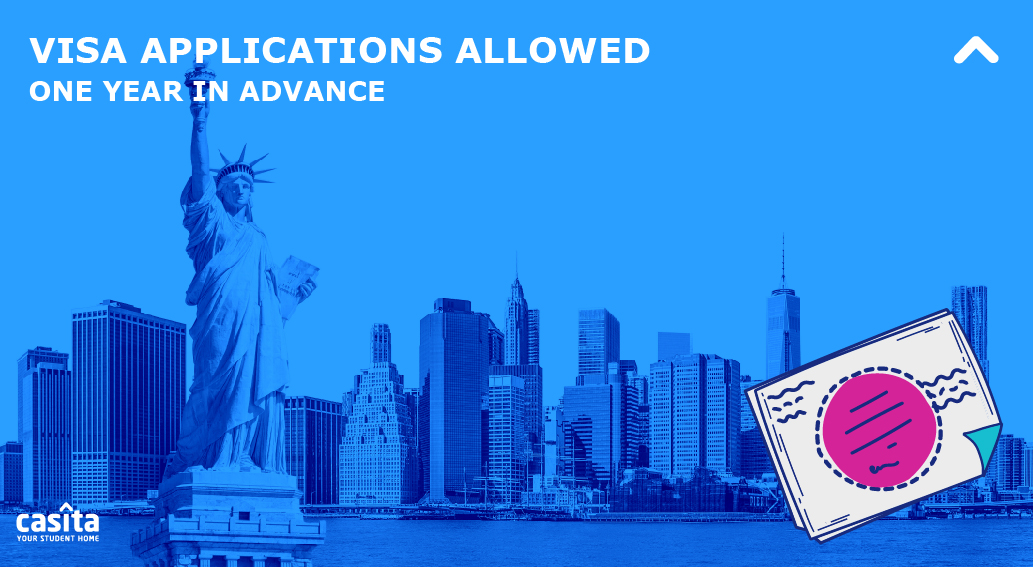US F-1 Visa Applications Allowed One Year in Advance
By Reem Mohamed
|
01 March, 2023
Share

Updated at:
Published at:
By Reem Mohamed
US F-1 Visa Applications Allowed One Year in Advance
By Reem Mohamed
|
01 March, 2023
Share

It has recently been announced that the US will start allowing student visa applications up to a year in advance.
Prospective students can now obtain an F-1 or M visa up to 365 days before their start date if they issued an I-20 form. This is according to a bid to get ahead of visa processing times which in turn led the US government to add this clause on the state department’s website.
Students, however, will still not be permitted to enter the US until they are within at most 30 days of the beginning of their designated university program.
While this new development is yet to be updated on the website for the Department of Homeland Security, it has been announced by the Department of State with immediate effect.
The Travel State Department took to Twitter to say the following: “@TravelGov: F and M student visas can now be issued up to 365 days in advance of the I-20 program start date, allowing more time for students to apply for a visa. Students are still not allowed to enter the U.S. on a student visa more than 30 days before their program start date.”
Prior to these new developments, an F-1 visa could only be granted to students up to 120 days before the start of their program and an I-20 dorm could only be granted up to six months before.
Jill Blondin, the associate vice provost for global initiatives at Virginia Commonwealth University, called this new development an exciting step. She also added, “It demonstrates a way to think outside of the box to manage the high demand for visas,”
Another person who was delighted by the news, Miriam Feldblum, the executive director of the President's Alliance on Higher Education and Immigration, said the following: “The Presidents’ Alliance has been working with U.S. government officials to improve the experience of international students with our immigration system at every stage, from the visa application process to USCIS processing to ensure greater flexibilities for students needing special student relief as well as experiential learning opportunities and pathways to green cards. The consular change is a positive one and goes alongside other improvements,”
NAFSA also made a comment, saying it “appreciates the steps taken” by the State Department, and proceeded to call the update “yet another improvement and will benefit both students and universities”.
Meanwhile on LinkedIn, the assistant VP of Webster University in Missouri, Samrat Ray Chaudhuri reacted to the update by calling the move a “significant update for all US-bound international students, agents, and DSOs/admissions officers at US universities”.
He also wrote that “Universities offering new programs can get a better understanding of their enrolment funnel much earlier than the start of classes,”
“This is going to be a key for planning and academic units can have ample time to find instructors and resources to accommodate growth in their numbers. Opening additional sections or closing down sections with low enrolment can be better planned,” he added.
This news comes around the same time that the Times of India reported some students from Hyderabad, who are not eligible for the interview waiver program, which was extended to December 2023 last year, were going to Asian nations like Vietnam and others to try and beat the current visa processing times in their home country.
A student’s comment indicated that if he had missed his chance to go for a visa interview in January, he would’ve likely “lost an academic year”.
While the US deals with the backlog and consequences of visa processing times better than other major study destinations across the globe, this still hampers the country. This is why the news of the time extension on the visa application could be considered an attempt to get rid of the problem and keep the visa processing time to a minimum.
This news will be most welcomed by the hundreds of thousands of Indian students attempting to obtain F-1s, especially with the current struggles of students in Hyderabad going to Vietnam and alleging that interview wait times can last up to 70 days.
Besides this news and new developments, USCIS also announced on the same day a clarification on the validity period of employment authorisation for F-1 students already in the country that are “experiencing severe economic hardship”, also known as Special Student Relief.
“[In this case], we may grant off-campus SSR employment authorisation to an F01 nonimmigrant student for the duration of the Federal Register notice validity period,” the update read, which is typically 18 months, six months more than the previous authorisation of a year.
“We are heartened by the announcements of SSR along with TPS for a growing number of countries that have been experiencing emergent circumstances. These updates will facilitate for students with these special circumstances the ability to adjust their course loads, and take on more work opportunities,” Feldblum said.
An extension past the end date of a student’s program will not be allowed, according to the USCUS announcement.
Rachel Banks, senior director of public policy and legislative strategy also commented on the matter with the following: “Yesterday’s notice is the first effort by USCIS to put forward such guidance. SSR employment authorisations should be issued for the full duration of the applicant’s SSR eligibility, which in many cases is 18 months. We hope to see further steps taken by USCIS to meet the needs of students on SSR, such as adding SSR-specific content to the Form I-765 Employment Authorisation instructions,”
